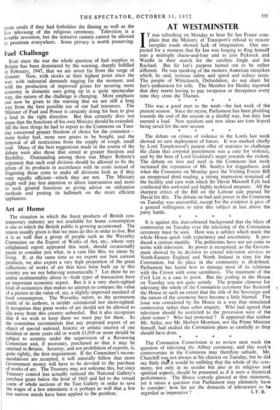Art at Home
The situation in which the finest products of British con- temporary industry are not available for home consumption is one to which the British public is growing accustomed. The reason usually given is that we must do this in order to live. But it is as well that a group of people such as the Waverley Committee on the Export of Works of Art, etc., whose very enlightened report appeared this week, should occasionally pause to consider just what, in a case like this, we mean by living. If, at the same time as we export our best current products, we also export a very high proportion of the great collections of works of art that have been built up in this country are we not behaving nonsensically ? Let there be no undue sentimentality about it—both types of transaction have an important economic aspect. But it is a very short-sighted kind of economics that makes no attempt to compare the value of a picture to the value of, say, a slightly improved standard of food consumption. The Waverley report, to the permanent credit of its authors, is neither sentimental nor short-sighted. It recognises that great works of art should not be allowed to slip away from this country unheeded. But it also recognises that if we wish to keep them we must pay for them. So the committee recommends that any proposed export of an object of special national, historic or artistic interest of one hundred or more years old or worth £1,000 or more should be subject to scrutiny under the supervision of a Reviewing Committee and, if necessary, purchased so that it may be retained in Britain. Scrutiny, and not prohibition of exports, is, quite rightly, the first requirement. If the Committee's recom- mendations are ,accepted, it will naturally follow that more Government money will have to be devoted to the purchase of works of art. The Treasury may not welcome this, but since Treasury control has actually reduced the National Gallery's purchase grant below the level of 1865 and led to the virtual waste of whole sections of the Tate Gallery in order to save the wages of a few attendants it is perhaps as well that a few less narrow minds have been applied to the problem.


































 Previous page
Previous page